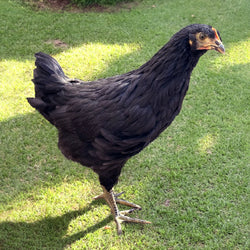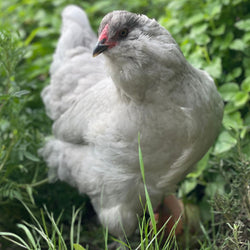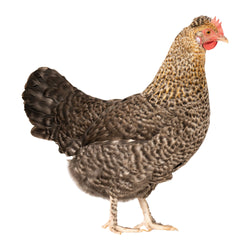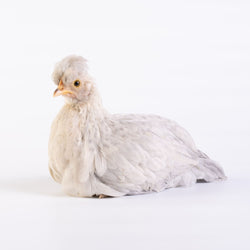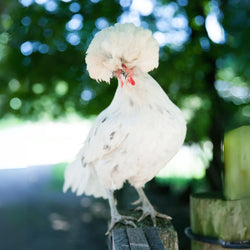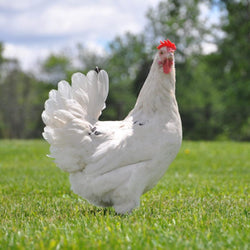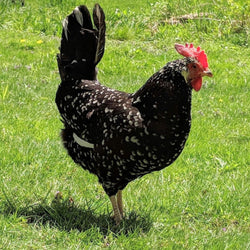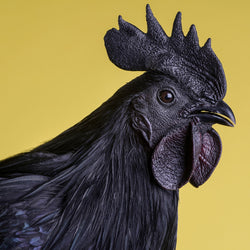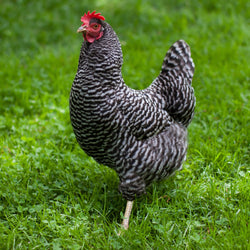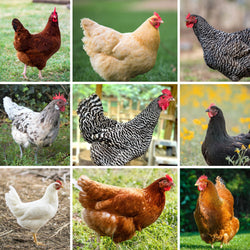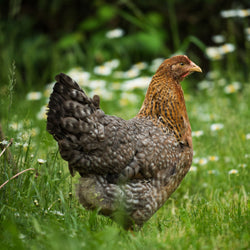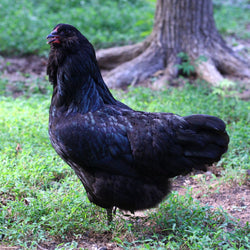f=menu&page=3/--
Frequently Asked Questions
Here we answer the most commonly-asked questions about ordering, chicken care, and more.
All about Myiasis disease
Myiasis Also called Flystrike, fly blown Prevalence Infrequent. It is more common in other animals such as sheep or horses. Signs General signs - Fatigue, weakness, ruffled feathers, depression, unpleasant odor, loss of appetite, wound area picked at by other birds,death Cardinal or diagnostic signs - Maggots found on the skin or in a wound Cause(s) Flies normally lay eggs in rotting or fecal matter. Some types of flies can infest wounds or skin lesions on chickens (and other animals), or can be drawn to lay eggs in fecal matter embedded in the bird's feathers, such as near the vent....
Read MoreAll about VVD disease
VVD disease produces twisted leg bones due to nutritional deficiencies or overly-fast weight gain in "broiler" breeds. Thankfully this is rare in backyard flocks that are fed a balanced, nutritionally complete diet, but it is more common in commercial broiler flocks. Read on to find out more: VVD Also called Varus/Valgus Deformity, Twisted leg, Crooked leg Prevalence Rare in home flocks; common in commercial "broilers" Signs General signs - Leg bone is bent or twisted (not broken). Cardinal or diagnostic signs - Be sure to differentiate this from a leg that is twisted at the joint; in VVD, the bone...
Read MoreAll about Botulism in poultry
Chickens seem to be able to ingest just about anything, don't they? But if they contract the Clostridium botulinum bacteria while foraging or by eating contaminated feed, they can get botulism, which is also known as food poisoning. Butulism is more or less dangerous, depending on how much of the contaminated food they ingested. Thankfully, this issue is rare, and there are steps you can take to protect your flock. Read on to find out more: Botulism Also called Food poisoning Prevalence Infrequent Signs General signs - Fatigue, weakness, ruffled feathers, diarrhea, sudden death Cardinal or diagnostic signs - Neurological...
Read MoreAll about Aspergillosis disease
Keeping your brooder and coop area clean and dry is essential if you want to protect your precious baby chicks and older birds from aspergillosis. Also known as "brooder pneumonia," baby chicks are especially vulnerable to the symptoms produced by the spores of the Aspergillus fungi that may grow in your brooder if it fluctuates between wet and dry conditions. Keep reading to find out more: Aspergillosis Also called Pneumonia, coop or brooder pneumonia, mycotic pneumonia, pneumomycosis Prevalence Infrequent Signs General signs - Respiratory symptoms, including discharge from nares (nostrils) and/or eyes, loss of appetite, coughing, panting, gasping for air,...
Read MoreAll about Lymphoid Leukosis (Avian Leukosis) disease
All about Lymphoid Leukosis (Avian Leukosis) disease|caLymphoid Leukosis is a tragic disease that affects a chicken's liver and can cause a painful death. Because of that, humane euthanasia is usually recommended to ease the suffering of poor birds that contract this illness and to help prevent the spread of the disease to other members of the flock. You'll definitely want to consult with a veterinarian if you suspect a member of your flock has this disease. Read on to find out more: Lymphoid Leucosis Also called Liver cancer, Liver disease, LL Prevalence Common Signs General signs - Fatigue, weakness, ruffled...
Read MoreAll about Ascites disease
If your bird has a large, reddish, swollen belly and but otherwise looks bluish, along with having respiratory issues like a cough, it's possible she has Ascites. Finding out the exact cause of the issue and the correct treatment will require the assistance of a qualified veterinarian. In many cases, providing a healthy environment for your flock can help protect them from ascites, so make sure you're doing that! Read on to find out more: Ascites Also called Pulmonary hypertension syndrome, waterbelly, fluid retained in abdomen Prevalence Uncommon, more common in meat-type breeds and varieties Signs General signs - Lethargy,...
Read MoreAll about Virulent Newcastle Disease
Virulent Newcastle Disease (VND) is no joke. It is easily spread among birds (wild and domestic), and once it is contracted, even birds that survive continue to be carriers of the virus, endangering all the birds around them. Because of this, VND is a reportable disease for which euthanasia is recommended. Read on to find out more: Virulent Newcastle Also called Pseudo-plague, Asiatic Newcastle, VVND, NVND, VND, Velogenic Newcastle, VN, Pneumoencephalitis, formerly called Exotic Newcastle Prevalence Rare Signs General signs Sudden death with no prior symptoms, or respiratory signs with a neurological component, including paralysis or partial paralysis of limbs,...
Read MoreAll about Domestic Newcastle disease
Domestic Newcastle Also called Newcastle Disease, Avian Distemper, Pseudofowl, ND, Parainfluenza, Fake Flu Prevalence Common Signs General signs - Coughing, sneezing, wheezing, lack of appetite, lethargy, huddling near heat source and fluffed-up down. Mucousy nares (nostrils). Occasionally layers exhibit a drop in laying and misshapen eggs. Some birds show signs of neurological disorders about two weeks after the respiratory illness. Mortality is low in backyard flocks with an owner who can isolate a bird until recovery. In large commercial flocks without close supervision, birds showing neurological symptoms can get picked to death. Cardinal or diagnostic signs - Lab ID, or...
Read More







"The Clubhouse" Coop
Easy to assemble and built to last, the Clubhouse Coop is the perfect starter coop for a small flock.
